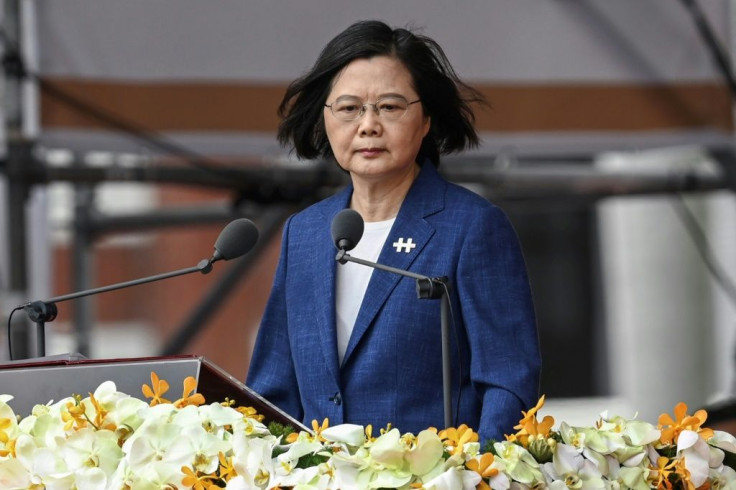China May Step Up Military Preparations After Taiwan President Tsai Confirms Presence of US Troops
KEY POINTS
- Taiwan downplayed Tsai's remarks saying the US troops were only on training exercises
- China has reacted that it "firmly opposes" military links between Taiwan and the U.S
- An analyst said Tsai was hinting that Taiwan has US support to deter PLA
Taiwanese President Tsai Ing-wen's recent confirmation that U.S. troops were stationed on the island has triggered China, which may step up its military preparations against the neighboring country that it considers as its breakaway province.
Analysts think Beijing would consider the first official confirmation of U.S. military presence in Taiwan as a "highly provocative move," reported South China Morning Post.
Amid increasing war threats on the Taiwan Strait, Tsai told CNN in an interview aired Wednesday that she believes that the United States would help to defend the island in the event of an attack by China. Confirming the presence of U.S. troops on the self-governed island, Tsai said Taiwan had a "wide range of cooperation with the U.S. aiming at increasing our defense capability."
Though Tsai did not say exactly how many U.S. military personnel are currently on the island, she added it was "not as many as people thought."
The comments have provoked Beijing, though Taiwan leadership immediately tried to downplay the remarks. Taiwanese Defence Minister Chiu Kuo-cheng quickly clarified that U.S. troops were not stationed on the island and are only conducting training exercises as part of exchange programs.
"Taiwan needs to rely on its own capabilities in order to defend itself, not merely hope for support from others. Helping the Taiwanese military with training is the U.S. troops’ only purpose," Chiu was quoted by Taiwan News.
Nevertheless, China has reacted that it "firmly opposes" military links between Taiwan and the U.S and the latter's "attempts to provoke and stir up trouble."
When asked about Tsai's comments, Chinese foreign ministry spokesperson, Wang Wenbin said, "Taiwan independence is a dead end, and there will also be no turning back for those who support it."
Chinese defense ministry spokesman Tan Kefei too warned the U.S. that "China will resolutely counter and fight back" if the U.S. continues to cling to the illusion of using Taiwan to contain China.
Meanwhile, analysts say think Tsai's revelation was a serious provocation to Beijing. Song Zhongping, a former PLA instructor and military affairs commentator, told South China Morning Post that Tsai was "saying that Taiwan has the backing of the U.S. so the PLA should not act rashly."
"This is a serious political and military provocation," he said. However, he added that Beijing would stick to a peaceful reunification and solicit Taiwanese public support. "But, on the other hand, mainland China will step up preparations for a military struggle with the U.S."
Earlier, the Chinese state-run tabloid Global Times ran an article quoting an analyst who said "more military actions are likely in the Taiwan Straits, and the U.S. military presence in the region will face more countermeasures from the PLA."
However, Wang Kung-yi, director of Taipei-based think tank Taiwan International Strategy Study Society, said Tsai’s comments are more aimed at turning "ambiguity to clarity" which she believed would help promote Taiwan’s security.
Washington maintains a policy of strategic ambiguity – a refusal to explicitly state whether it would take military action for Taiwan – on the issue.

© Copyright IBTimes 2024. All rights reserved.





















